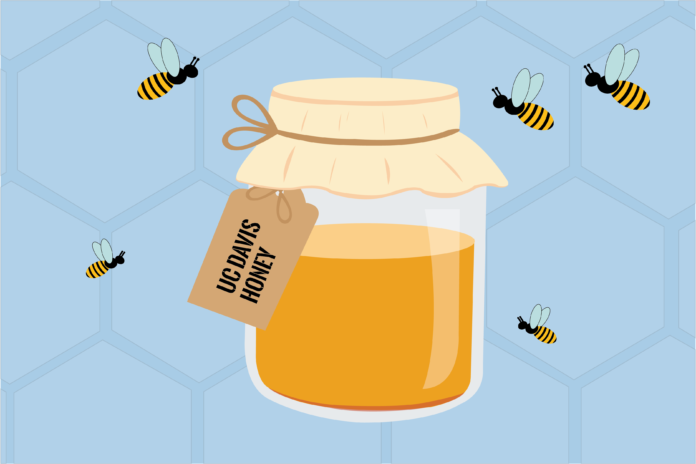Center focuses on outreach with bee industry professionals through cross-disciplinary work
With the recent uptick in awareness of the “save the bees” message, the topic of bees and their rapidly declining population have been all the buzz. For years, the UC Davis Honey and Pollination Center has been working with several departments on campus to raise awareness about honeybees, pollination and bee-related products through education, research and outreach to those in the industry.
The center gains much of its publicity through several events it hosts throughout the year, including the honey tasting event held during Picnic Day. Other events hosted by the center are catered to a specific audience, whether that be industry professionals or families.
The Annual Bee Symposium brings in about 200 to 300 beekeepers for a one-day seminar that hosts an internationally-known speaker from the industry as well as several other presentations that cover topics from bee health and migration to the philosophy of beekeeping.
For more amateaur honey enthusiasts, the center hosts the California Honey Festival in Downtown Woodland, which approximately 35,000 attendees flock to for a lively day of learning about bees and honey tasting.
The center’s work has a broad impact throughout the campus, including on such academic departments as entomology, viticulture and food science. It also spreads its roots in the Arboretum — the campus joined the Bee City USA program and became one of 90 bee campuses in the country.
The center’s accomplishments are thanks to the dedication of its director, Amina Harris. Having owned her own honey company since 1980, Harris has a significant amount of experience in the honey industry and is the driver behind much of the research and outreach the center does. Harris hopes to promote the cross disciplinary research that the center has done with the Department of Food Science and Veterinary Medicine — Harris developed a technique for treating burns on animals by sewing on tilapia skin and using a salve created with olive oil, beeswax, honey and a few other ingredients.
“We get it made, we put everybody’s logo on it, it would just be so much fun to be able to market this real UCD cross pollination product,” Harris said.
The center also works closely with the Bee Lab, which does its own separate research. The Bee Lab’s location in the agricultural research fields on campus gives them the opportunity to house honeybees as well as offer unique academic experiences, such as the California Master Beekeeping Program, initially created in conjunction with the Honey and Pollination Center.
The center itself offers its own full series of courses in making mead, allowing people with any level of experience to get involved. The Meadmaking Bootcamp is a one-day course geared toward beginners who want to explore hands-on mead making from beginning to end and introduces participants to different tastes and styles. There are two additional courses, 201 and 301, that are for more experienced mead makers.
Since the center is not funded by the university, the course costs go directly toward financing the center — as such, the courses may be pricey, but Harris offers a volunteer route for students.
“You need a ton of volunteers to make programs like this work,” Harris said. “They have to be pouring mead, they have to be cupping honey, they have to be getting a lot of stuff together, they have to help setup, breakdown, clean up. So the volunteers essentially come and sit in for free.”
The courses do not currently offer credit, but Harris hopes to provide this as an option in the near future.
As for the future of the center, Harris has ambitious plans in terms of research and industry engagement with the steady focus on raising awareness of the values and varieties of honey.
“We want to make sure that everything on campus is kind of aligned, especially as I go forward with […] hopefully what will become national testing,” Harris said. “I have an international group that’s interested in funding our research, and that’s always the issue, if I can get the funding, then I can do the research and the research will help promote American honey. I want [beekeepers] to understand that they shouldn’t sell their honey for less, and they should be proud of it.”
Written by: Lei Otsuka — features@theaggie.org




